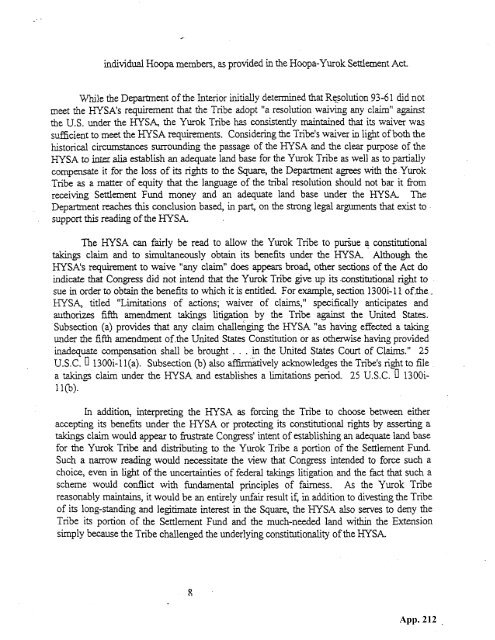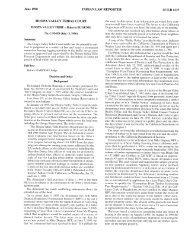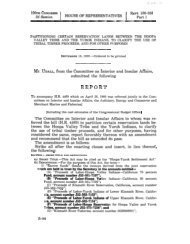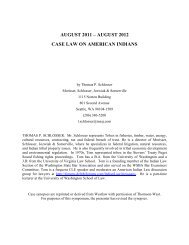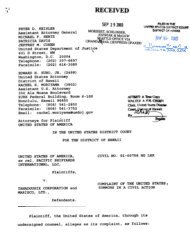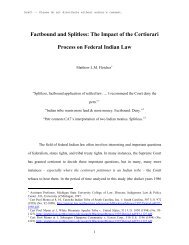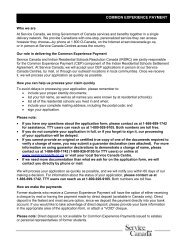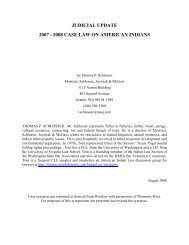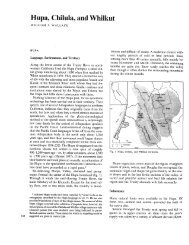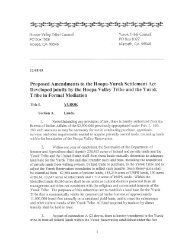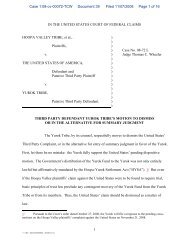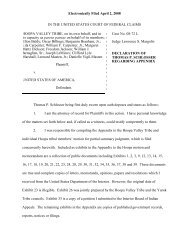Hoopa appendix supporting summary judgment - Schlosser Law Files
Hoopa appendix supporting summary judgment - Schlosser Law Files
Hoopa appendix supporting summary judgment - Schlosser Law Files
Create successful ePaper yourself
Turn your PDF publications into a flip-book with our unique Google optimized e-Paper software.
individual <strong>Hoopa</strong> members, as provided in the <strong>Hoopa</strong>-Yurok Settlement Act<br />
While the Department of the Interior initially deteimined that R~solution93-61 did not<br />
meet the HYSA’s requirement that the Tribe adopt “a resolution waiving any claim” against<br />
the U.S. under the HYSA, the Yurok Tribe has consistently maintained that its waiver was<br />
sufficient to meet the HYSA requirements. Considering the Tribe’s waiver in light ofboth the<br />
historical circumstances surrounding the passage of the HYSA and the clear purpose of the<br />
HYSA to inter alia establish an adequate land base for the Yurok Tribe as well as top~~y<br />
compensate it for the loss of its tights to the Square, the Department agrees with the Yurok<br />
Tribe as a matter of equity that the language of the tribal resolution should not bar it from<br />
receiving Settlement Fund money and an adequate land base under the HYSA. The<br />
Department reaches this conclusion based, in part, on the strong legal arguments that exist to.<br />
support this reading ofthe HYSA.<br />
The HYSA can fairly be read to allow the Yurok Tribe to pur~uea constitutional<br />
takings claim and to simultaneously obtain its benefits under the HYSA. Although the<br />
HYSA’s requirement to waive “any claim” does appears broad, other sections of the Act do<br />
indicate that Congress did not intend that the Yurok Tribe give up its constitutional right to<br />
sue in order to obtain the benefits to which it is entitled. For example, section 1300i-ll ofthe.<br />
HYSA, titled “Limitations of actions; waiver of claims,” specifically anticipates and<br />
authorizes fi~i amendment takings litigation by the Tribe against the United States.<br />
Subsection (a) provides that any claim cha11ei~gingthe HYSA “as having effected a taking<br />
under the fifth amendment ofthe United States Constitution or as otherwise having provided<br />
inadequate compensation shall be brou~’nt. . . in the United States Court of Claims.” 25<br />
U.S.C. 0 13001-11(a). Subsection (b) also afflrrnatIvely acknowledges the Tribe’s right to file<br />
a takin~claim under the HYSA and establishes a limitations period. 25 U.S.C. 0 1300i-<br />
11(b).<br />
In addition, interpreting the HYSA as forcing the Tribe to choose between either<br />
accepting its benefits under the HYSA or protecting its constitutional rights by asserting a<br />
takings claim would appear to fit~strateCongress’ intent of establishing an adequate land base<br />
for the Yurok Tribe and distributing to the Yurok Tribe a portion of the Settlement Fund.<br />
Such a nan-ow reading would necessitate the view that Congress intended to force such a<br />
choice, even in light of the uncertainties of federal takings litigation and the fact that such a<br />
scheme would conflict with fundamental principles of fairness. As the Yurok Tribe<br />
reasonably maintains, it would be an entirely unfair result if, in addition to divesting the Tribe<br />
of its long-standing and legitimate interest in the Square, the HYSA also serves to deny the<br />
Tribe its portion of the Settlement Fund and the much-needed land within the Extension<br />
simply because the Tribe challenged the underlying constitutionality ofthe HYSA.<br />
g


